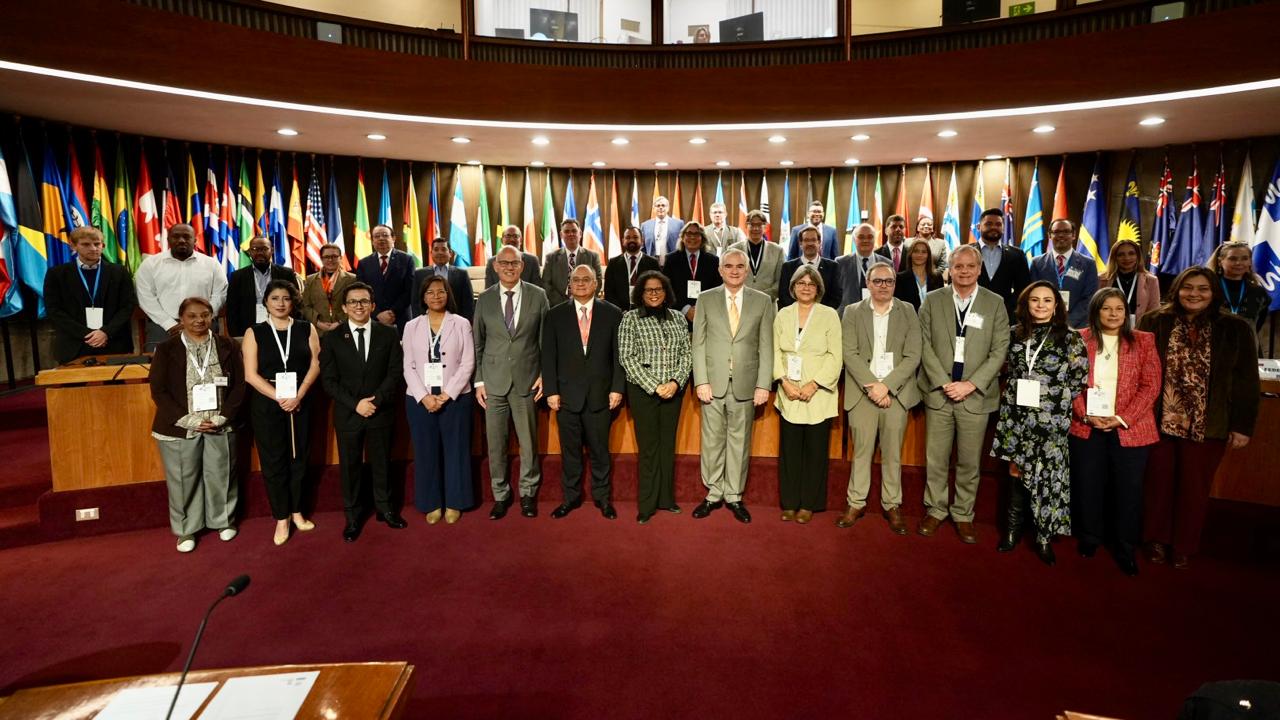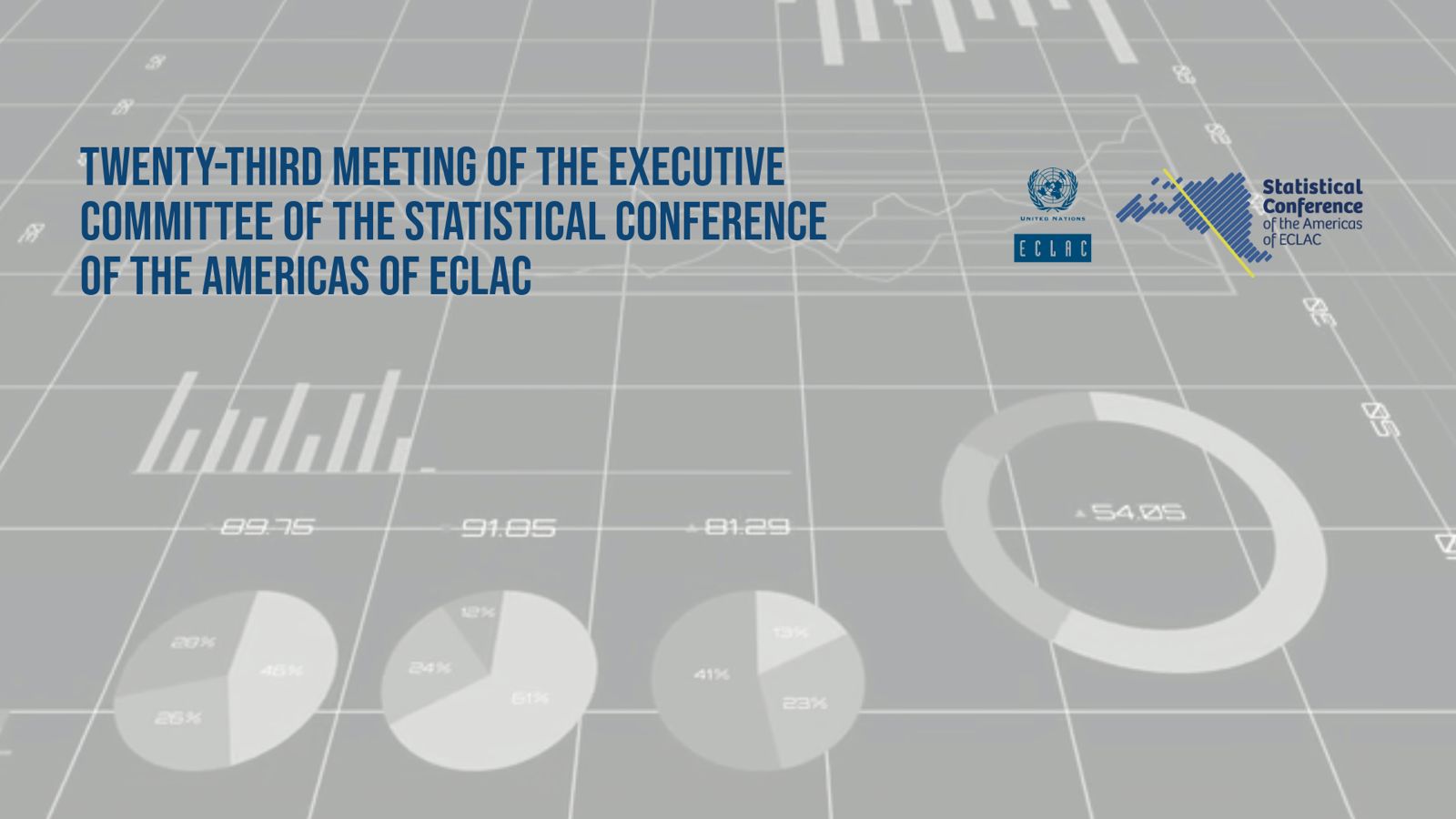Authorities Discuss the Future of Statistical Production in the Region and Reaffirm its Relevance for Addressing Emerging Needs and Global Challenges
Work area(s)
The twenty-third meeting of the Executive Committee of the Statistical Conference of the Americas of ECLAC was inaugurated today in Santiago, Chile.

Authorities from Latin America and the Caribbean discussed the future of statistical production in the region and reaffirmed its relevance for addressing emerging needs and global challenges, at the twenty-third meeting of the Executive Committee of the Statistical Conference of the Americas of ECLAC (SCA-ECLAC), which was inaugurated today at the central headquarters of the Economic Commission for Latin America and the Caribbean (ECLAC) in Santiago, Chile.
Participating in the two-day gathering are representatives of national statistical offices from the region, regional and international organizations, and United Nations agencies, funds and programs, among other actors.
The meeting was inaugurated by José Manuel Salazar-Xirinachs, ECLAC’s Executive Secretary; Miosotis Rivas Peña, Director-General of the National Office of Statistics of the Dominican Republic, the country serving as Chair of the SCA-ECLAC Executive Committee; and Stefan Schweinfest, Director of the United Nations Statistics Division (virtually). Also participating were Luis Fidel Yáñez, ECLAC’s Secretary of the Commission, and Rolando Ocampo, Director of the regional commission’s Statistics Division.
“Information production must be at the center of public policy discussions. That is the only way to ensure that our decisions will be based on solid evidence and that our efforts to achieve sustainable development will be effective,” José Manuel Salazar-Xirinachs, ECLAC’s Executive Secretary, affirmed in his opening remarks.
He added that statistical capacity is one of the most critical technical, operational, political and prospective (TOPP) capacities of institutions, and he underscored that accurate, up-to-date and complete data is crucial for measuring development gaps and traps and evaluating the policies geared towards closing those gaps and escaping those traps.
ECLAC’s highest authority said the region’s countries face significant challenges in the production of official statistics, but there are also valuable opportunities for strengthening this production. One of the most promising developments is the use of administrative records as a source of information, he said.
José Manuel Salazar-Xirinachs stressed the relevance of the Statistical Conference of the Americas, which is a subsidiary body of ECLAC and “the main regional space for collaboration so that countries and international organizations can work together to seek out shared solutions to statistical challenges.”
“The work and contributions of the Statistical Conference of the Americas have made considerable progress along diverse lines of action, and it is our hope that this progress not only be maintained but also bolstered. Our aspiration is that the collaborative work between countries, in the framework of this Conference, will continue to be a pillar for strengthening statistical production and its application in public policies,” he indicated.
Meanwhile, the Director-General of the Dominican Republic’s National Office of Statistics, Miosotis Rivas Peña, addressed the challenges for Latin America and the Caribbean’s statistical production posed by issues such as big data and Artificial Intelligence. “These issues have already made it onto our agenda, and they require our commitment and collaboration,” she stated.
In addition, she emphasized that strengthening the community of women leaders in National Statistical Offices is crucial. “Diversity in leadership not only enriches our perspectives, it is also essential for addressing the challenges we face in these environments,” she said.
Stefan Schweinfest, Director of the UN Statistics Division, noted that Latin America and the Caribbean is a region that is part of the global community, which is characterized by our standards – which are our shared global language – so that we can reach agreement from East to West, and North to South.
“I want to thank all of you, not only for working within your region but also for being very active members of the global community in various organizations, working groups and in the Statistical Commission,” he affirmed.
During the twenty-third meeting of the Executive Committee of the Statistical Conference of the Americas of ECLAC, representatives of Latin America and the Caribbean’s national statistical institutes will analyze progress on the statistical cooperation program at a regional and international level. They will also review the regional challenges that must be addressed in the SCA’s new 2026-2035 Strategic Plan and will examine progress on the implementation of the 2024-2025 Biennial Programme of Regional and International Cooperation Activities.
The Statistical Conference of the Americas is a subsidiary body of ECLAC and the main forum for discussing the development of statistics in the region. Its principal mandates include promoting the development and improvement of national statistics and their international comparability, along with international, regional and bilateral cooperation between national offices and international and regional agencies.
Along with the Dominican Republic as Chair, the SCA’s Executive Committee in the 2024-2025 period is made up of Argentina, the Bahamas, Grenada, Mexico, Peru, Spain and Uruguay.
Related content

Twenty-third meeting of the Executive Committee of the Statistical Conference of the Americas of ECLAC
This twenty-third meeting of the Executive Committee of the Statistical Conference of the Americas was held from 28 to 29 August 2024, at the headquarters of ECLAC in Santiago, Chile.

Representatives of National Statistical Institutes from Latin America and the Caribbean Will Analyze the Outlook for Statistical Production in the Region in the Coming Years
The Executive Committee of the Statistical Conference of the Americas of ECLAC will hold its twenty-third meeting on August 28-29, 2024 at the regional organization’s central headquarters in Santiago…

Representatives of National Statistical Offices Share Innovations and Lessons Learned from the 2020 Census Round
The event, held in the framework of the twenty-third meeting of the Executive Committee of the Statistical Conference of the Americas of ECLAC, sought to contribute to planning and preparing the 2030…
Related link(s)
Country(ies)
- Latin America and the Caribbean
Contact
Public Information Unit
- prensa@cepal.org
- (56 2) 2210 2040
